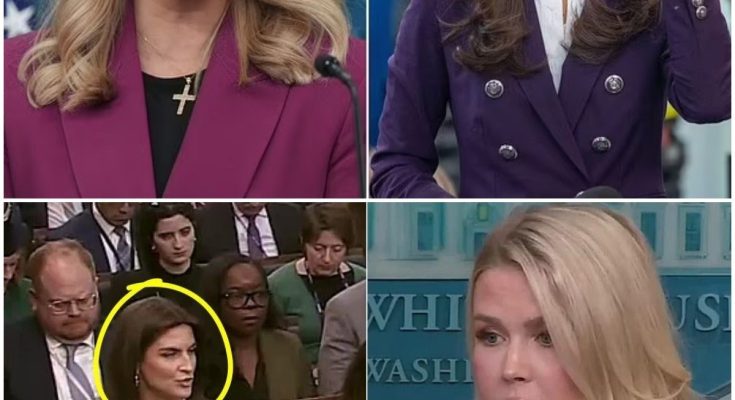In a recent heated press briefing, tensions rose as White House spokesperson Caroline addressed allegations concerning classified military information reportedly leaked in a private messaging thread involving prominent administration officials.
At the center of the controversy is Pete Hegseth, who detailed the timing and weapons involved in a sensitive military operation, igniting fierce debates over the classification status of the information.
The controversy stems from a messaging chat, which included specifics about a military strike, such as the deployment of F-18 fighter jets and Tomahawk missiles.
Questions arose after the revelation that messages explicitly mentioned timing details of military actions 31 minutes prior to launch, raising concerns about national security implications.
Caroline strongly dismissed claims that classified information was compromised, reiterating the stance of Secretary of Defense Pete Hegseth and other high-ranking security officials. According to Caroline, the Defense Department explicitly clarified that no classified details, war plans, or sensitive sources were disclosed in the messaging thread.

“The Secretary of Defense himself released a clear statement this morning specifying precisely why none of the information shared was classified,” Caroline asserted.
She further emphasized that this viewpoint has been consistently upheld under oath by top national security officials including the CIA Director, FBI Director, and Director of National Intelligence.
Journalists pressed on, referencing the Department of Defense’s classification manual, which explicitly categorizes significant military operation plans as secret.
Reporters questioned how information detailing exact times, military equipment, and targets could be interpreted otherwise. Caroline consistently referred back to the official statement from the Secretary of Defense, asserting that the messaging thread represented a policy discussion rather than operational military plans.
Adding fuel to the controversy was a comment made by Vice President Mike Pence, who openly criticized European nations for not contributing sufficiently to global security efforts.
Pence described Europe’s reliance on U.S. military support as “freeloading,” a sentiment echoed by President Trump during an earlier briefing. The administration has been vocal about expecting European allies to assume greater responsibility, particularly regarding securing crucial maritime trade routes like the Suez Canal.

In addressing reporters’ persistent questions about potential repercussions for those involved, Caroline firmly stated that President Trump maintains unwavering confidence in his National Security team, suggesting no dismissals or resignations would be forthcoming due to this incident.
The administration also directly criticized media coverage surrounding the incident, particularly singling out reporter Jeffrey Goldberg, accusing him of sensationalism and political bias. Caroline urged the public to consider the credibility of the Secretary of Defense against a reporter she labeled as “anti-Trump.”
The press briefing took an even more contentious turn when journalists highlighted concerns from the perspective of service members, asking if future operational security could be compromised by similar disclosures.
Caroline reassured that President Trump, alongside his defense secretary, prioritizes troop safety above all else, emphasizing that no action by the administration would intentionally endanger American lives.
Reflecting on operational success, Caroline stated unequivocally that the recent military actions against Houthi targets have significantly weakened terrorist operations in the region, showcasing the administration’s effective management of threats inherited from previous administrations. She argued that these successful outcomes vindicated the administration’s handling of the messaging situation.

Critics remain skeptical. Public concerns persist around the criteria used to define classified military information and whether this incident sets a worrying precedent for handling sensitive national security communications.
As investigations continue by the National Security Council and White House counsel’s office, Elon Musk has notably volunteered his expertise to investigate how Goldberg’s contact information inadvertently appeared in the contentious chat.
Amid escalating debate, conservative commentators have also weighed in, including influential Trump supporter Dave Portnoy, who publicly stated that Congressman Mike Waltz, implicated by association, should resign.
The administration swiftly defended Waltz, underscoring Trump’s consistent stance of trust in his current security advisors and dismissing resignation calls.
As the White House navigates this unfolding controversy, it faces significant public scrutiny over transparency and accountability in managing national security.
With debates around classified information definitions and the implications of leaked communications continuing, President Trump’s administration remains resolute in defending its stance and the integrity of its senior officials.



